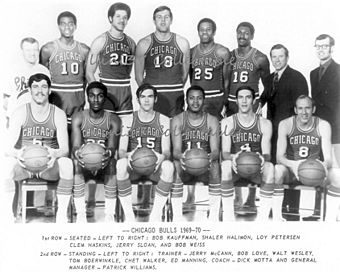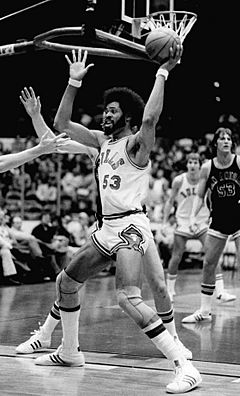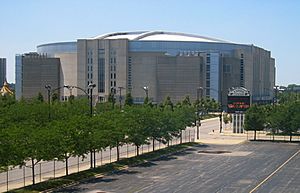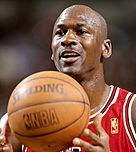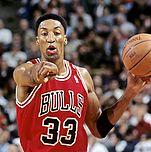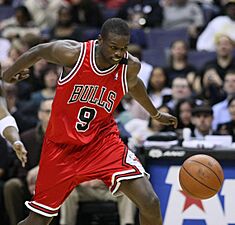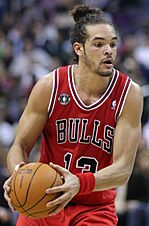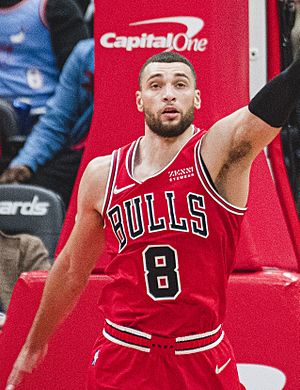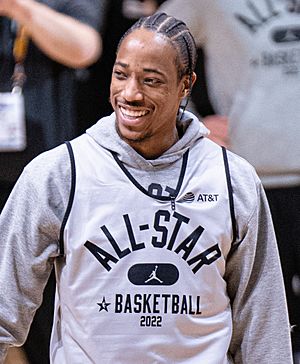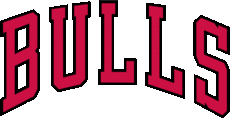Chicago Bulls facts for kids
Quick facts for kids Chicago Bulls |
|||||
|---|---|---|---|---|---|
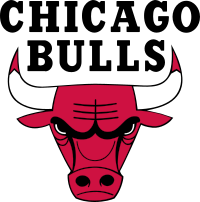 |
|||||
| Conference | Eastern | ||||
| Division | Central | ||||
| Founded | 1966 | ||||
| History | Chicago Bulls 1966–present |
||||
| Arena | United Center | ||||
| Location | Chicago, Illinois | ||||
| Team colors | Red, black, white |
||||
| Main sponsor | Motorola Mobility | ||||
| President | Michael Reinsdorf | ||||
| General manager | Marc Eversley | ||||
| Head coach | Billy Donovan | ||||
| Ownership | Jerry Reinsdorf | ||||
| Affiliation(s) | Windy City Bulls | ||||
| Championships | 6 (1991, 1992, 1993, 1996, 1997, 1998) | ||||
| Conference titles | 6 (1991, 1992, 1993, 1996, 1997, 1998) | ||||
| Division titles | 9 (1975, 1991, 1992, 1993, 1996, 1997, 1998, 2011, 2012) | ||||
| Retired numbers | 4 (4, 10, 23, 33) | ||||
|
|||||
The Chicago Bulls are a professional basketball team from Chicago, Illinois. They play in the National Basketball Association (NBA). The Bulls are part of the Eastern Conference and the Central Division. The team started on January 16, 1966. Their first game was in the 1966–67 NBA season. The Bulls play their home games at the United Center. They share this arena with the National Hockey League's Chicago Blackhawks. Both teams used to play at the Chicago Stadium, which is no longer standing.
The Bulls became very famous in the 1990s. They helped make the NBA popular all over the world. They are known for having one of the greatest teams in NBA history. They won six NBA championships between 1991 and 1998. This included two "three-peats," meaning they won three championships in a row twice. All six championship teams were led by amazing players Michael Jordan and Scottie Pippen, and coach Phil Jackson. The Bulls are the only NBA team to win many championships without ever losing in the NBA Finals. In the 1995–96 season, the Bulls won 72 games. This was an NBA record for wins in a season. The record stood until the Golden State Warriors won 73 games in the 2015–16 season. The Bulls were the first NBA team to win 70 or more games in a single season.
After 1998, the Bulls faced challenges. They struggled in the 2000s. But they showed promise in the early 2010s with players like Derrick Rose and Joakim Noah. They had great seasons in 2010–11 and 2011–12. However, injuries to Rose and trades of key players led to a rebuilding period. Michael Jordan and Derrick Rose both won the NBA Most Valuable Player Award while playing for the Bulls. The Bulls have rivalries with the Cleveland Cavaliers, Detroit Pistons, Miami Heat, and New York Knicks. The rivalry with the Pistons was especially strong in the late 1980s and early 1990s.
Contents
- Team History: How the Bulls Started and Grew
- 1966–1975: Early Days and First Successes
- 1976–1984: New Players and Challenges
- 1984–1990: Michael Jordan Joins the Bulls
- 1990–1993: Three Championships in a Row!
- 1993–1995: Jordan's First Break and Pippen Leads
- 1995–1998: Jordan's Return and More Championships
- 1998–2008: A Difficult Decade After Jordan
- 2008–2016: The Derrick Rose Era
- 2017–2025: The LaVine Era and Beyond
- Team Rivalries
- Team Traditions
- Team Name, Logo, and Uniforms
- Team Mascots
- Season-by-Season Records
- Team Records
- Training Facilities
- Home Arenas
- Team Personnel
- Head Coaches
- Hall of Famers and Honored Numbers
- Team Media
- See also
Team History: How the Bulls Started and Grew
1966–1975: Early Days and First Successes
The Chicago Bulls became an NBA team on January 16, 1966. They were the third NBA team in Chicago's history. Before them were the Chicago Stags (1946–1950) and the Chicago Packers/Zephyrs (1961–1963). Dick Klein started the team. He was the only Bulls owner who had played professional basketball. Klein was also the team's general manager and president in the early years.
After a special draft, the Bulls could pick players from other teams. In their first season (1966–67), the Bulls won their first game on October 15. They beat the St. Louis Hawks. They finished the season with 33 wins and 48 losses. This was the best record for any new NBA team at that time. They were also the first new team to make the playoffs. Guard Guy Rodgers led the league in assists. He and forward Jerry Sloan were named All-Stars. Their coach, Johnny "Red" Kerr, won Coach of the Year.
The Bulls first played home games at the International Amphitheatre. Later, they moved to Chicago Stadium. After their strong start, fewer fans came to games. In 1969, Klein hired Pat Williams as general manager. Williams helped the team become popular again. He made important player changes and introduced Benny the Bull, the team's first mascot. This helped bring more fans to games.
Under Williams and coach Dick Motta, the Bulls made the playoffs for four years in a row. In 1972, they won a team record of 57 games. Key players during this time included Sloan, Bob Love, Chet Walker, and Norm Van Lier. In 1975, the Bulls reached the conference finals for the first time. They lost to the Golden State Warriors in a close series. After this, Williams left, and Motta became both coach and general manager. The team's performance declined. Motta was fired in 1976 and Ed Badger took over.
1976–1984: New Players and Challenges
The Wirtz family, who owned the Chicago Blackhawks, bought the Bulls. They did not spend much money on the team.
Artis Gilmore joined the Bulls in 1976. He led the team with guard Reggie Theus, and forwards David Greenwood and Orlando Woolridge.
In 1979, the Bulls lost a coin flip that would have given them the first pick in the NBA draft. If they had won, they would have picked Magic Johnson. Instead, they picked David Greenwood. The Los Angeles Lakers picked Magic Johnson.
After Gilmore was traded, the Bulls focused on offense with Theus. Guards Quintin Dailey and Ennis Whatley also joined. But the team still struggled. In the 1983–84 season, Theus was traded. Fan attendance dropped. The Wirtz family wanted to sell the team to owners who might move it out of Chicago. But eventually, local owners bought the team.
1984–1990: Michael Jordan Joins the Bulls
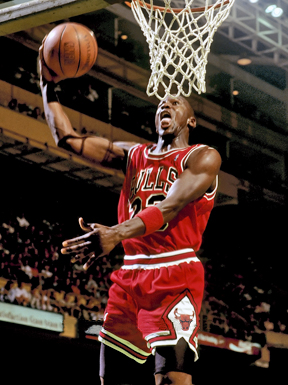
In 1984, the Bulls had the third pick in the 1984 NBA draft. The Rockets picked Hakeem Olajuwon, and the Blazers picked Sam Bowie. The Bulls chose Michael Jordan, a shooting guard. New owner Jerry Reinsdorf and general manager Jerry Krause decided to build the team around Jordan. Jordan broke team records in his first year for scoring and steals. He led the Bulls back to the playoffs, where they lost to the Milwaukee Bucks. Jordan was named NBA Rookie of the Year.
The next year, the team got point guard John Paxson. They also traded for power forward Charles Oakley. Jordan, Paxson, Oakley, and center Dave Corzine were key players. Jordan broke his foot early in the 1985–86 season. He returned for the playoffs. The Bulls, who had one of the worst records to make the playoffs, faced the strong Boston Celtics. Even though the Bulls lost, Jordan scored a playoff record 63 points in one game. This record still stands today.
In the 1986–87 season, Jordan led the league in scoring with 37.1 points per game. He was named to the All-NBA First Team. The Bulls made the playoffs again but were swept by the Celtics.
In the 1987 draft, the Bulls picked Horace Grant and traded for Scottie Pippen. With Paxson, Jordan, Pippen, Grant, and center Bill Cartwright, the Bulls won 50 games. They reached the Eastern Conference semifinals but lost to the Detroit Pistons. Jordan won the NBA Most Valuable Player award. This season also started the big rivalry between the Pistons and the Bulls.
In the 1988–89 season, Charles Oakley was traded for Bill Cartwright. The Bulls also got Craig Hodges. The new starting lineup took time to play well together. They reached the Eastern Conference Finals but lost to the Pistons again.
In 1989–90, Jordan led the league in scoring for the fourth year. Pippen joined him as an All-Star. Assistant coach Phil Jackson became the new head coach. The Bulls also added Stacey King and B. J. Armstrong. The Bulls reached the Conference Finals again. They pushed the Pistons to seven games but lost for the third year in a row. The Pistons then won their second NBA championship.
1990–1993: Three Championships in a Row!
In the 1990–91 season, the Bulls won a team record 61 games. They easily went through the playoffs. They swept the Knicks, beat the 76ers, and then swept the defending champion Pistons. In the NBA Finals, they beat Magic Johnson and the Los Angeles Lakers in five games. This was their first championship!
The Bulls won their second championship in a row in 1992. They set another team record with 67 wins. They swept the Miami Heat in the first round. Then they beat the Knicks in seven games and the Cleveland Cavaliers in six games. In the Finals, they defeated Clyde Drexler and the Portland Trail Blazers in six games.
In 1993, the Bulls won their third championship in a row. They beat the Atlanta Hawks, Cleveland Cavaliers, and New York Knicks in the playoffs. In the Finals, they faced Charles Barkley and the Phoenix Suns. John Paxson made a game-winning three-pointer with 3.9 seconds left in Game 6. This gave the Bulls a 99–98 victory and their third straight title.
1993–1995: Jordan's First Break and Pippen Leads
On October 6, 1993, Michael Jordan surprised everyone by saying he was retiring from basketball. This happened three months after his father passed away. Scottie Pippen then became the team's leader. He showed he was one of the best players in the league. He won the 1994 All-Star MVP award. Horace Grant and B. J. Armstrong also became All-Stars. Other important players were Cartwright, Perdue, Pete Myers, and rookie Toni Kukoč. The Bulls won 55 games in the 1993–94 season. But they lost to the Knicks in seven games in the second round of the playoffs. The Knicks later lost in the NBA Finals. In the 1994–95 season, the Bulls moved from Chicago Stadium to their new home, the United Center.
In 1994, the Bulls lost Grant, Cartwright, and Scott Williams to other teams. John Paxson retired. The Bulls added Ron Harper and Jud Buechler. The team struggled at the start of the 1994–95 season. Then, on March 18, 1995, Michael Jordan announced he was coming back! He scored 55 points in only his fifth game back. Jordan led the Bulls to the playoffs, where they beat the Charlotte Hornets. However, Jordan and the Bulls lost to the Orlando Magic, who had Horace Grant, Penny Hardaway, and Shaquille O'Neal.
Before the next season, the Bulls traded Will Perdue for Dennis Rodman. Rodman was known for being a great rebounder. He had won the last four rebounding titles. He was also part of the "Bad Boys" Pistons team that was a big rival to the Bulls in the late 1980s.
1995–1998: Jordan's Return and More Championships
With Jordan, Pippen, Rodman, Harper, and Longley as starters, and a strong bench including Steve Kerr, Kukoč, and Bill Wennington, the Bulls were expected to win the NBA Finals.
The Bulls started the 1995–96 season with a win over the Hornets. Michael Jordan scored 42 points in that game. The Bulls had one of the best seasons in NBA history. They went from 47 wins to 72 wins and 10 losses. They were the first NBA team to win 70 or more games. Jordan won his eighth scoring title. Rodman won his fifth straight rebounding title. Jordan won the NBA MVP, NBA All-Star Game MVP, and NBA Finals MVP. General Manager Jerry Krause was named NBA Executive of the Year. Phil Jackson was Coach of the Year. Kukoč won Sixth Man of the Year. Both Pippen and Jordan were on the All-NBA First Team. Jordan, Pippen, and Rodman were on the All-Defensive First Team.
The 1995–96 team also set other records. They had the best road record (33–8) and the best start to a season (41–3). They also had a great home record (39–2). The team beat the Miami Heat, New York Knicks, and Orlando Magic in the playoffs. Then they defeated Gary Payton, Shawn Kemp, and the Seattle SuperSonics for their fourth championship. Many people consider the 1995–96 Chicago Bulls one of the greatest teams ever.
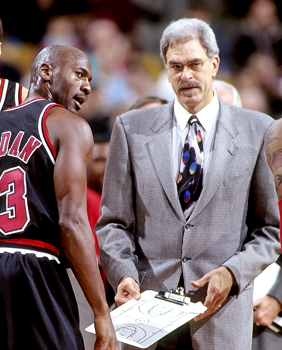
In the 1996–97 season, the Bulls almost had another 70-win season. They finished 69–13. They were very strong at home, winning 39 games and losing only 2. The Bulls won their fifth NBA championship by beating the Bullets, Hawks, and Heat in the playoffs. Then they defeated John Stockton, Karl Malone, and the Utah Jazz in the Finals. Jordan won his ninth scoring title. Rodman won his sixth straight rebounding title. Jordan and Pippen were also named among the 50 greatest players in NBA history.
The 1997–98 season was a difficult one for the Bulls. Many thought it would be Michael Jordan's last season. Coach Phil Jackson's future was also uncertain because of problems with General Manager Jerry Krause. Scottie Pippen wanted a new contract but wasn't getting one. Despite these issues, the Bulls had a great season, finishing 62–20. Jordan won his fifth and final league MVP award. The Bulls were the top team in the Eastern Conference for the playoffs.
In the first round of the playoffs, the Bulls swept the New Jersey Nets. The next round against the Charlotte Hornets was tougher. The Hornets won Game 2, tying the series. But the Bulls won the next three games easily. The Eastern Conference Finals against the Reggie Miller-led Indiana Pacers was a big challenge. The Pacers won all their home games, forcing a Game 7 at the United Center. The Bulls won 88–83, earning their sixth Eastern Conference title.
In the NBA Finals, the Bulls faced the Utah Jazz again. The Jazz won Game 1. But the Bulls won Game 2, tying the series. Back in Chicago, the Bulls won the next two games, taking a 3–1 lead. The Jazz won Game 5 by two points. Game 6 was a very close battle. Scottie Pippen had a back injury but kept playing. Late in the game, with the Bulls down by three, Michael Jordan led them to victory. Jordan made a shot to get within one point. Then he stole the ball from Karl Malone and made the game-winning shot with 5.2 seconds left. The Bulls won 87–86. John Stockton missed a three-pointer at the end. This gave the Bulls their sixth championship in eight years. Jordan was named Finals MVP for the sixth time. He retired for the second time on January 13, 1999.
1998–2008: A Difficult Decade After Jordan
1998–2004: The "Baby Bulls" Era
The summer of 1998 marked the end of the Bulls' championship era. General Manager Jerry Krause decided to rebuild the team. He traded Scottie Pippen and let Dennis Rodman leave. Other key players were also traded for draft picks. Krause hired Tim Floyd to replace Phil Jackson as coach. Michael Jordan retired for the second time. The new Bulls team, led by Toni Kukoč, finished with a 13-37 record in the short 1998–99 season. They even scored a record-low 49 points in one game.
Winning the draft lottery allowed the Bulls to pick Elton Brand. He had a great first year and shared the Rookie of the Year award. But injuries and trades meant the team only won 17 games in 1999–2000. The Bulls tried to sign top free agents but failed. New players like Brad Miller and Ron Mercer didn't help much. The team had the worst record in the league, 15-67, the next season. Krause then traded Brand for Tyson Chandler and drafted Eddy Curry. The team struggled without experienced players. Coach Floyd was replaced by Bill Cartwright. They finished with only 21 wins.
In 2002–03, there was hope with new player Jay Williams and a young team. But they were inconsistent, finishing 30-52. Krause retired in 2003, and John Paxson became the new General Manager. Williams' career ended early due to a motorcycle accident. Pippen returned but was often injured. In 2003–04, Eddy Curry and Tyson Chandler faced setbacks. Cartwright was fired, and Scott Skiles became coach. A big trade changed the team's focus to defense. But the Bulls still finished 23-59. Kirk Hinrich became a fan favorite and made the All-Rookie team.
2004–2009: Continuing to Rebuild
From 2004 to 2008, the Chicago Bulls changed their roster a lot. They were trying to become a strong team again. In the 2004 NBA Draft, General Manager John Paxson picked Ben Gordon, Luol Deng, and Chris Duhon. They also signed Andrés Nocioni. The team started with nine losses in a row. But they recovered and finished 47–35. They made the playoffs for the first time since 1998. However, injuries to Deng and Eddy Curry led to them losing in the first round to the Washington Wizards. Ben Gordon won the NBA Sixth Man of the Year award.
In 2005, Eddy Curry's heart condition was a concern. He was traded to the New York Knicks. The Bulls struggled without a strong player near the basket. But they finished the season 41–41. They made the playoffs but lost to the Miami Heat, who went on to win the championship. Even with the loss, the young players gained important playoff experience.
In the 2006 NBA Draft, the Bulls traded for Tyrus Thomas and Thabo Sefolosha. They also signed Ben Wallace, a great defensive player. Tyson Chandler, the last player from the Krause era, was traded. Chicago started slowly but finished the season 49–33. In the playoffs, they swept the defending champion Miami Heat. This was their first playoff series win since 1998. They then lost to the Detroit Pistons.
In 2007, there were rumors of big trades for players like Kevin Garnett and Kobe Bryant, but nothing happened. The Bulls started the 2007–08 season poorly. Coach Scott Skiles was fired in December. Jim Boylan became interim coach, but the team finished 33–49. They traded Ben Wallace for Drew Gooden and Larry Hughes. After the season, Boylan was not kept as coach. Vinny Del Negro, a new coach, was hired.
2008–2016: The Derrick Rose Era
2008–2010: Derrick Rose Arrives
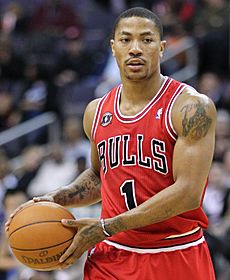
The Bulls had a very small chance (1.7%) of getting the first pick in the 2008 NBA draft lottery. But they won! On June 26, 2008, the Bulls drafted Derrick Rose, a player from Chicago, as the number 1 pick. They also drafted Sonny Weems at number 39, but later traded him. The Bulls made other trades, including getting Ömer Aşık. They also re-signed Luol Deng to a long contract, though he was injured for much of the season.
In February 2009, the Bulls made more trades to improve the team. They got Brad Miller and John Salmons from the Sacramento Kings. These moves helped the team make the playoffs, finishing with a 41–41 record. In the playoffs, they faced the Boston Celtics in an exciting seven-game series. In Game 1, Derrick Rose scored 36 points and had 11 assists. This tied a record for most points by a rookie in their playoff debut. The series had many overtime periods. The Celtics eventually won after seven games.
In the 2009 NBA Draft, the Bulls picked James Johnson and Taj Gibson. They lost Ben Gordon to another team. The next season, they made more trades. The Bulls finished as the eighth seed in the 2010 playoffs. But they lost to the Cleveland Cavaliers in five games. In May 2010, coach Vinny Del Negro was fired.
2010–2011: Tom Thibodeau and Rose's MVP Season
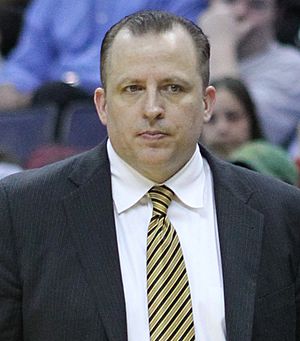
In June 2010, Tom Thibodeau, an assistant coach for the Boston Celtics, became the Bulls' new head coach. He was officially introduced on June 23. On July 7, Carlos Boozer agreed to join the Bulls. The Bulls also traded Kirk Hinrich to make more room for new players. They signed Kyle Korver and Ömer Aşık. They also signed Ronnie Brewer, C.J. Watson, Kurt Thomas, Keith Bogans, and Brian Scalabrine.
Derrick Rose won the 2011 NBA MVP Award. He became the youngest player in NBA history to win it. He was the first Bulls player since Michael Jordan to win this award. The Bulls finished the regular season with the best record in the league, 62–20. They were the top team in the Eastern Conference for the first time since 1998. The Bulls beat the Indiana Pacers and the Atlanta Hawks in the playoffs. They reached the Eastern Conference finals for the first time since 1998. They faced the Miami Heat. The Bulls won the first game but lost the next four, ending their season.
2011–2014: Injuries to Derrick Rose
The Chicago Bulls faced many challenges from 2011 to 2014, especially with injuries to their star players. In the 2011 NBA draft, the Bulls picked Jimmy Butler. They signed Rip Hamilton and extended Derrick Rose's contract. Rose and Luol Deng were both chosen for the All-Star game in the 2011–12 season. This was the first time two Bulls players were All-Stars since Michael Jordan and Scottie Pippen. Even though Rose missed many games due to injuries, the Bulls finished with the best record in the NBA (50–16).
In the first playoff game, Rose tore his ACL (a knee ligament). This injury kept him out for the rest of the series. Joakim Noah also got a foot injury. Without their key players, the Bulls lost the series in six games to the Philadelphia 76ers. This was a big upset because the Bulls were the top team. After this, players like Kyle Korver, C.J. Watson, and Ömer Aşık left. The team added Marco Belinelli, Nate Robinson, and Nazr Mohammed.
Rose missed the entire 2012–13 season. Still, the Bulls finished 45–37 and won a seven-game series against the Brooklyn Nets. They then lost to the Miami Heat in five games. During this season, the Bulls ended Miami's 27-game winning streak and the New York Knicks' 13-game winning streak.
In 2013–14, Rose got another serious injury, tearing his medial meniscus. This happened just 10 games into the season. The Bulls traded Luol Deng to the Cleveland Cavaliers. Despite this, the Bulls finished 48–34 and had home-court advantage in the playoffs. But they lost in the first round to the Washington Wizards. Joakim Noah had an amazing season. He won Defensive Player of the Year and was named to the All-NBA First Team.
In 2014, the Bulls made more changes. They traded for Doug McDermott and signed Pau Gasol. They also brought over Nikola Mirotić and re-signed Kirk Hinrich.
2014–2015: Rose Returns and Butler Shines
The 2014–15 season brought new hope for the Chicago Bulls. Derrick Rose was back, and they added two-time NBA champion Pau Gasol. The team had many good players like Taj Gibson, Nikola Mirotić, Tony Snell, Aaron Brooks, Doug McDermott, and Kirk Hinrich. They were seen as one of the top teams in the Eastern Conference. The Bulls started strong, winning seven of their first nine games.
Jimmy Butler became a much better scorer, going from 13 to 20 points per game. He was a candidate for the "Most Improved Player of the Year" award. Gasol played very well, getting many double-doubles (double-digit points and rebounds). Both Butler and Gasol were chosen for the All-Star team. However, the Bulls struggled to play consistently in the second half of the season. Rose openly said he was frustrated with the team. There were also problems between coach Tom Thibodeau and the team's management.
The Bulls finished the regular season with a 50–32 record. They were the third seed in the Eastern Conference. In the first round of the playoffs, they played the Milwaukee Bucks. The Bulls took a 3–0 lead but then lost two games in a row. However, they won Game 6 by a record 54 points to advance. In the next round, they faced the Cleveland Cavaliers, led by LeBron James. The Bulls won Game 1, but Cleveland came back strong. Derrick Rose made a dramatic game-winning three-pointer in Game 3. But the Bulls eventually lost the series 4–2. After this, there was a lot of talk about coach Thibodeau's future.
2015–2017: Changes in Coaching and Players
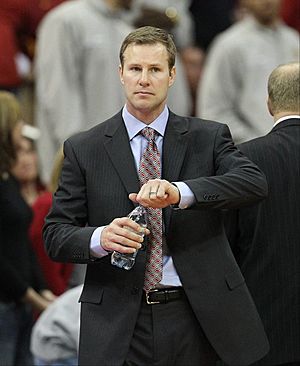
On May 28, 2015, the Bulls fired Tom Thibodeau. The next month, Fred Hoiberg became the new head coach. The Bulls picked Bobby Portis in the 2015 NBA Draft.
Forward Mike Dunleavy Jr. was out for four months due to back surgery. So, Doug McDermott became the starting small forward. The Bulls started the 2015–16 season well, winning against the Cleveland Cavaliers. They had an 8–3 record early on. But they struggled in the middle of the season, losing 12 of 17 games. Jimmy Butler was out for four weeks with a knee injury. The Bulls finished 42–40 and missed the playoffs for the first time in eight years.
In 2016, the Bulls made big changes to their team. On June 22, 2016, they traded Derrick Rose, Justin Holiday, and a draft pick to the New York Knicks. In return, they got Robin Lopez, Jerian Grant, and José Calderón. Calderón was later traded. In July, the Bulls signed veteran guard Rajon Rondo and Chicago native Dwyane Wade. They also got Michael Carter-Williams in a trade.
In February 2017, the team traded Taj Gibson, Doug McDermott, and a draft pick to the Oklahoma City Thunder. They received Cameron Payne, Anthony Morrow, and Joffrey Lauvergne. Despite these changes, Jimmy Butler had a great season. He set new career highs, was an All-Star, and made the All-NBA third team. The Bulls finished 41–41 and made the playoffs as the eighth seed. They took a surprising 2–0 lead over the top-seeded Boston Celtics. But they eventually lost the series 4–2.
2017–2025: The LaVine Era and Beyond
2017–2020: Rebuilding the Team
In June 2017, the Chicago Bulls traded Jimmy Butler and a draft pick to the Minnesota Timberwolves. In return, they got Zach LaVine, Kris Dunn, and a pick used to select Lauri Markkanen. They also let go of Rajon Rondo and Isaiah Canaan. Justin Holiday rejoined the Bulls. Dwyane Wade left the team after an agreement.
On October 17, 2017, a fight happened between Bobby Portis and Nikola Mirotić during practice. Portis punched Mirotić, causing injuries. Portis was suspended. Mirotić was later traded to the New Orleans Pelicans. The Bulls finished the 2017-18 season with a 27–55 record.
In 2018, the Bulls drafted Wendell Carter Jr. and Chandler Hutchison. They re-signed Zach LaVine. They also signed Jabari Parker. After a bad start to the 2018-19 season, Fred Hoiberg was fired. Jim Boylen became the new coach. In February 2019, Bobby Portis and Jabari Parker were traded for Otto Porter. The Bulls finished the season 22-60 and missed the playoffs.
In 2019, the Bulls picked Coby White and signed Tomáš Satoranský and Thaddeus Young. After the COVID-19 pandemic, Artūras Karnišovas became the Bulls' executive vice president. Marc Eversley was hired as general manager. Jim Boylen was fired, and Billy Donovan became head coach in 2020. The Bulls drafted Patrick Williams.
In March 2021, the Bulls traded for Nikola Vučević and Al-Farouq Aminu. They sent Wendell Carter Jr, Otto Porter, and draft picks to Orlando. Despite these moves, the Bulls finished the 2020-21 season 31-41. They missed the playoffs for the fourth year in a row.
2021–2024: The DeRozan-LaVine Team
In 2021, the Chicago Bulls made several big changes to their team. They drafted Ayo Dosunmu. They traded for Lonzo Ball and signed Alex Caruso. The Bulls also got DeMar DeRozan from the San Antonio Spurs.
The new team started very well. They were the top team in the Eastern Conference in January 2022. DeRozan played amazingly, making game-winning shots in back-to-back games. He was chosen for the All-Star team, and LaVine joined him. But Lonzo Ball got a knee injury and was out for a long time. The team struggled without him. They finished sixth in the Eastern Conference. They lost in the first round of the playoffs to the Milwaukee Bucks in five games.
In 2022, the Bulls re-signed LaVine to their largest contract ever. They drafted Dalen Terry. They also signed Patrick Beverley during the season to try and make the playoffs. But the team was still inconsistent. The Bulls finished 40–42 in the 2022–23 season. They made the play-in tournament, beating the Toronto Raptors. But they were eliminated by the Miami Heat.
In 2023, the Bulls traded for a draft pick and selected Julian Philips. They also re-signed Vucevic and Coby White. The Bulls finished 39–43, again making the play-in tournament. After beating the Atlanta Hawks, they were eliminated by the Miami Heat for the second year in a row.
2024-Present: New Changes for the Bulls
DeMar DeRozan signed with the Sacramento Kings in a trade deal. The team also traded Alex Caruso to the Oklahoma City Thunder for Josh Giddey. Andre Drummond signed with the Sixers. In the draft, Matas Buzelis was picked by the Bulls. After two seasons out with injury, Lonzo Ball returned to play. On February 2, 2025, the team traded Zach LaVine to the Sacramento Kings. They received Zach Collins, Tre Jones, Kevin Huerter, and a draft pick. The Bulls finished the 2024-25 season with a 39-43 record. They were 9th in the Eastern Conference. They made the play-in tournament but lost to the Miami Heat for the third year in a row. This meant they missed the playoffs again.
Team Rivalries
Cleveland Cavaliers
The Bulls and Cleveland Cavaliers have a rivalry. It became strong when the Bulls drafted Michael Jordan in 1984. After Jordan left, the rivalry cooled down. But it heated up again when Cleveland picked LeBron James in 2003. When the Bulls drafted Derrick Rose in 2008, the rivalry became even more intense.
Detroit Pistons
The Bulls' main rivals in their division are the Detroit Pistons. This rivalry started in 1988 when Jordan's Bulls played the "Bad Boy" Pistons. The two teams met in the playoffs for four years in a row. The Pistons won each time until 1991. In the 1991 Eastern Conference Finals, the Bulls swept the Pistons. The Pistons famously walked off the court before the game ended. The rivalry was renewed in 2007 when Ben Wallace played against his old team, the Pistons. The two cities are close, which makes the rivalry even stronger. Their games are often very physical.
Miami Heat
The rivalry between the Bulls and the Miami Heat began in the 1990s. The Bulls often eliminated the Heat from the playoffs and then went on to win championships. The rivalry became strong again when the Bulls returned to the playoffs. Players like Dwyane Wade and Derrick Rose made it exciting. Their games were often physical, with hard fouls. The Bulls and Heat met in the 2011 Eastern Conference Finals. The Heat won in five games. On March 27, 2013, Chicago ended Miami's 27-game winning streak. They met again in the 2013 Eastern Conference Semifinals, and Miami won. In 2023, 2024, and 2025, the two teams met in the Eastern Conference play-in tournament. The Heat eliminated the Bulls each time.
New York Knicks
The Bulls also have a strong rivalry with the New York Knicks. They met in the playoffs for four years in a row (1991–1994) and again in 1996. Two of their series (1992 and 1994) went to a full seven games. Their first playoff game was in 1989. Both teams were getting better with Michael Jordan and Patrick Ewing. The Bulls won that first playoff series. The Bulls won against the Knicks in the playoffs from 1991–1993. They lost in 1994 but got revenge in 1996. Like with Detroit, the history between the cities adds to the rivalry.
Team Traditions
Starting Lineup Introductions
The Bulls' player introductions became famous around the world during their championship years. Announcer Tommy Edwards was the first to use the songs "Sirius" and "On The Run" for game introductions. Ray Clay took over in 1990 and continued using "Sirius" for all six championship runs. The lights dim during the visiting team's introduction, with music like "The Imperial March" from Star Wars. Then, almost all lights turn off for the Bulls' introduction. A spotlight shines on each player as they are introduced and run onto the court. Lasers and fireworks were added at the United Center. Computer animations show a "Running of the Bulls" smashing a bus with the opposing team's logo.
Traditionally, players are introduced in a specific order: small forward, power forward, center, point guard, shooting guard. During the championship era, Scottie Pippen was usually introduced first or second, and Michael Jordan was always last. (Pippen and Jordan are the only players who played on all six championship teams.) With Derrick Rose, the point guard was introduced last. Tommy Edwards returned as announcer in 2006. He introduced a new remix of the "Sirius" theme. Tim Sinclair replaced Edwards in 2020.
Black Shoes and Socks
The Bulls have a tradition of wearing black shoes during the playoffs. This started in 1989. Backup center Brad Sellers suggested wearing black shoes to show team unity. For the 1996 playoffs, they were the first team to wear black socks with black shoes. Many teams now use this look. When the Bulls made the playoffs in 2004–05 after six years, they continued this tradition.
There have been a few exceptions. In the 1995 playoffs, Michael Jordan wore white shoes in Orlando. He was fined for not following the team's color rule. In the 2009 playoffs, all Bulls players wore white shoes and socks in one game. More recently, with new NBA rules, some Bulls players have worn red or white shoes.
Circus Trip
The Bulls and the Chicago Blackhawks used to share a unique tradition. Every fall, the Ringling Bros. and Barnum & Bailey Circus came to Chicago. Since the circus used large indoor venues, it took over the United Center. This forced the Bulls and Blackhawks to go on a long road trip for about two weeks. This trip was called "the circus trip." The circus stopped coming to Chicago after 2016.
Team Name, Logo, and Uniforms
Team Name
Dick Klein wanted a name that reminded people of Chicago's meat packing industry. He also thought about the Union Stock Yards near Chicago Stadium. Klein considered names like Matadors or Toreadors. But he decided on "Bulls" after his son Mark said, "Dad, that's a bunch of bull!"
Team Logo
The Bulls are special because they have used almost the same logo since they started. The famous logo is a red, charging bull's face. Dean P. Wessel designed the logo in 1966. In the early 1970s, the Bulls had an alternate logo. It was the same bull logo, but with a cloud that said "Windy City" below the bull's nose.
Team Uniforms
1966–1973 Uniforms
The Bulls wear three main uniforms: white, red, and black. The first uniforms looked similar to today's design. They had the famous diamond shape around the Bulls logo on the shorts. They also had block letters. The original uniforms had black shadows on the letters and red or white stripes on the sides. In the 1969–70 season, the red uniforms were changed to include the city name.
1973–1985 Uniforms
In the 1973–74 season, the Bulls changed their look a lot. They removed the side stripes and shadows. The numbers on the front moved to the left chest. The white uniforms had "Bulls" curved vertically. The red uniforms had black letters and a script "Chicago" wordmark. These uniforms were used until 1985.
These uniforms were brought back as throwback uniforms in the 2003–04 and 2015–16 seasons.
1985–Present Uniforms
Starting in the 1985–86 season, the Bulls updated their uniform. The numbers were centered, and the "Bulls" wordmark was curved vertically on both red and white uniforms.
When Nike became the NBA's uniform provider in 2017, the Bulls kept most of their look. They added the Chicago four stars on the waistline. Nike changed how home and away uniforms were named. The red "Icon" uniforms became their home uniforms, and the white "Association" uniforms became their away uniforms. The Bulls wore red "Icon" uniforms at home until the 2020–21 season. They returned to wearing white "Association" uniforms at home starting in the 2021–22 season.
Alternate Black Uniforms
In the 1995–96 season, the Bulls added a black uniform. This first black uniform had red pinstripes and no diamond on the shorts. This design was used again as a throwback in the 2012–13 seasons.
From 1997–98 to 2005–06, the Bulls wore slightly changed black uniforms without pinstripes. This design also brought back the city name on the front in 1999–2000.
The 2006–07 season saw another change to the black alternate uniform. It now looked like the red and white uniforms, with a red diamond on the shorts. For the 2014–15 season, the uniforms were updated to include sleeves and a modern diamond design.
Since the 2017–18 season, the Bulls' black uniforms have been called "Statement" uniforms. They are worn in away games against teams wearing white, gray, or cream uniforms.
The 2019–20 season brought back pinstripes to the "Statement" uniform, but in dark gray. The diamond design was red, and four six-point stars were on the beltline. The Bulls wore this uniform in some home games and away games.
Other Uniforms
The Chicago Bulls have worn many special uniforms for different events.
- Throwback Uniforms: In 2005–06, the Bulls honored the old Chicago Stags team with red and blue throwback uniforms.
- St. Patrick's Day Uniforms: From 2006 to 2017, the Bulls wore green versions of their red uniforms around St. Patrick's Day.
- Noche Latina: Between 2009 and 2017, the Bulls wore red uniforms for the NBA's "Noche Latina" (Latin Night). These often said "Los Bulls."
- Green Week: In 2009, the Bulls wore dark green uniforms for the NBA's "Green Week." This was to raise awareness for environmental issues.
- Christmas Day Uniforms: The Bulls wore special Christmas uniforms for NBA Christmas Day games from 2012 to 2016.
- Pride Uniforms: From 2015 to 2017, the Bulls wore gray sleeved Pride uniforms.
Nike City Uniforms
Nike introduced the Bulls' "City" uniforms in 2017. These uniforms celebrate Chicago's flag, buildings, and culture.
- 2017–2018: White with red "Chicago" writing and stars, like Chicago’s flag.
- 2018–2019: Black with parts of the flag’s red stars and blue stripes.
- 2019–2020: Light blue with a changed Bulls logo, inspired by Lake Michigan and the Chicago River.
- 2020–2021: Dark gray with gold letters and red accents, showing Chicago's Art Deco buildings.
- 2021–2022: A red design mixing parts from old uniforms, like black and white stripes and cursive "Chicago" writing.
- 2022–2023: White with rust red letters and red and black side stripes, like Chicago’s "Y" symbol.
- 2023–2024: Black, inspired by the Chicago Stadium. It had a vertical "Chicago" wordmark.
- 2024–2025: Gray and sand uniform celebrating 30 years of the United Center. It used designs from the arena's signs and famous starting lineup spotlights.
Team Mascots
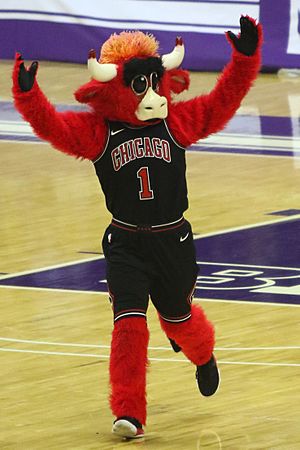
Benny the Bull is the main mascot of the Chicago Bulls. He first appeared in 1969. Benny is a red bull who wears number 1. He is one of the oldest and most famous mascots in sports. The Bulls also had another mascot named Da Bull. He was introduced in 1995. Da Bull was known for his amazing dunks. Da Bull was retired after an incident in 2004. Benny has a friendly design, while Da Bull looked more like a real bull and was brown.
Season-by-Season Records
Here are the results for the last five seasons the Bulls have played. For all seasons, see List of Chicago Bulls seasons.
Note: GP = Games played, W = Wins, L = Losses, W–L% = Winning percentage
| Season | GP | W | L | W–L% | Finish | Playoffs |
| 2020–21 | 72 | 31 | 41 | .431 | 3rd, Central | Did not qualify |
| 2021–22 | 82 | 46 | 36 | .561 | 2nd, Central | Lost in first round, 1–4 (Bucks) |
| 2022–23 | 82 | 40 | 42 | .488 | 3rd, Central | Did not qualify |
| 2023–24 | 82 | 39 | 43 | .476 | 4th, Central | Did not qualify |
| 2024–25 | 82 | 39 | 43 | .476 | 5th, Central | Did not qualify |
Team Records
Training Facilities
Alumni Hall at DePaul University was the Bulls' practice place in the 1960s and 1970s.
In 1992, the team started training at the Berto Center in Deerfield, Illinois.
On June 13, 2012, the team announced they would move their practice facility downtown. This would be closer to the United Center. On September 12, 2014, the Bulls opened their new training facility, the Advocate Center. It is one block east of the United Center.
Home Arenas
| Arena | |
| Arena | Years Used |
|---|---|
| International Amphitheatre | 1966–1967 |
| Chicago Stadium | 1967–1994 |
| United Center | 1994–present |
Team Personnel
Current Roster
Draft Rights Held
The Bulls hold the rights to players they drafted who are playing outside the NBA. These players can sign with any non-NBA team. The Bulls keep their draft rights until one year after their contract with the non-NBA team ends. This list also includes rights from trades.
| Draft | Round | Pick | Player | Position | Nationality | Current Team | Notes | Ref |
|---|
Team Leaders (All-Time)
Bold means the player is still with the team. Italics means the player is still active but not with the team.
- Points Scored (Regular Season) (as of the end of the 2024–25 season)
- 1. Michael Jordan (29,277)
- 2. Scottie Pippen (15,123)
- 3. Bob Love (12,623)
- 4. Luol Deng (10,286)
- 5. Jerry Sloan (10,233)
- 6. Zach LaVine (10,056)
- 7. Chet Walker (9,788)
- 8. Artis Gilmore (9,288)
- 9. Kirk Hinrich (8,536)
- 10. Reggie Theus (8,279)
- 11. Derrick Rose (8,001)
- 12. Ben Gordon (7,372)
- 13. Horace Grant (6,866)
- 14. Norm Van Lier (6,505)
- 15. Coby White (6,405)
- 16. Jimmy Butler (6,208)
- 17. Toni Kukoč (6,148)
- 18. Orlando Woolridge (6,146)
- 19. Nikola Vučević (6,013)
- 20. DeMar DeRozan (5,831)
- 21. Dave Greenwood (5,824)
- 22. B. J. Armstrong (5,553)
- 23. Mickey Johnson (5,531)
- 24. Dave Corzine (5,457)
- 25. Joakim Noah (5,325)
- 26. Taj Gibson (5,280)
- 27. John Paxson (4,932)
- 28. Bob Boozer (4,807)
- 29. Tom Boerwinkle (4,596)
- 30. Quintin Dailey (4,473)
- 31. Bob Weiss (4,445)
- 32. Carlos Boozer (4,347)
- 33. Andres Nocioni (4,120)
- 34. Clem Haskins (3,703)
- 35. Bill Cartwright (3,638)
- 36. Wilbur Holland (3,568)
- 37. Lauri Markkanen (3,439)
- 38. Eddy Curry (3,414)
- 39. Charles Oakley (3,162)
- 40. Elton Brand (3,117)
- 41. Steve Kerr (3,109)
- 42. Ricky Sobers (3,059)
- 43. Scott May (3,048)
- 44. Ayo Dosunmu (2,856)
- 45. Nikola Mirotic (2,774)
- 46. Ron Harper (2,760)
- 47. Jalen Rose (2,742)
- 48. Jamal Crawford (2,737)
- 49. Jim Washington (2,736)
- 50. Patrick Williams (2,636)
- Other Statistics (Regular Season) (as of the end of the 2024–25 season)
| Most Minutes Played | |
|---|---|
| Player | Minutes |
| Michael Jordan | 35,887 |
| Scottie Pippen | 30,269 |
| Jerry Sloan | 24,798 |
| Kirk Hinrich | 23,545 |
| Luol Deng | 22,882 |
| Bob Love | 22,073 |
| Norm Van Lier | 19,122 |
| Horace Grant | 18,204 |
| Joakim Noah | 16,848 |
| Artis Gilmore | 16,777 |
| Most Rebounds | |
|---|---|
| Player | Rebounds |
| Michael Jordan | 5,836 |
| Tom Boerwinkle | 5,745 |
| Scottie Pippen | 5,726 |
| Joakim Noah | 5,387 |
| Jerry Sloan | 5,385 |
| Artis Gilmore | 5,342 |
| Horace Grant | 4,721 |
| Dave Greenwood | 4,222 |
| Luol Deng | 4,078 |
| Bob Love | 3,998 |
| Most Assists | |
|---|---|
| Player | Assists |
| Michael Jordan | 5,012 |
| Scottie Pippen | 4,494 |
| Kirk Hinrich | 3,811 |
| Norm Van Lier | 3,676 |
| Derrick Rose | 2,516 |
| Reggie Theus | 2,472 |
| John Paxson | 2,394 |
| Bob Weiss | 2,008 |
| Tom Boerwinkle | 2,007 |
| Toni Kukoč | 1,840 |
| Most Steals | |
|---|---|
| Player | Steals |
| Michael Jordan | 2,306 |
| Scottie Pippen | 1,792 |
| Kirk Hinrich | 857 |
| Norm Van Lier | 724 |
| Luol Deng | 639 |
| Horace Grant | 587 |
| Jimmy Butler | 583 |
| Reggie Theus | 580 |
| Joakim Noah | 481 |
| Toni Kukoč | 476 |
| Most Blocks | |
|---|---|
| Player | Blocks |
| Artis Gilmore | 1,029 |
| Michael Jordan | 828 |
| Joakim Noah | 803 |
| Scottie Pippen | 774 |
| Taj Gibson | 695 |
| Horace Grant | 579 |
| Dave Corzine | 573 |
| Dave Greenwood | 526 |
| Tyson Chandler | 487 |
| Luol Deng | 360 |
| Most Three-Pointers Made | |
|---|---|
| Player | 3-pointers made |
| Zach LaVine | 1,130 |
| Kirk Hinrich | 1,049 |
| Coby White | 985 |
| Ben Gordon | 770 |
| Scottie Pippen | 664 |
| Michael Jordan | 555 |
| Nikola Vučević | 505 |
| Lauri Markkanen | 493 |
| Nikola Mirotić | 432 |
| Steve Kerr | 430 |
Head Coaches
Hall of Famers and Honored Numbers
Basketball Hall of Famers
| Chicago Bulls Hall of Famers | |||||
|---|---|---|---|---|---|
| Players | |||||
| No. | Name | Position | Years with Team | Inducted | |
| 42 | Nate Thurmond | Center | 1974–1976 | 1985 | |
| 8 | George Gervin | Guard/Forward | 1985–1986 | 1996 | |
| 00 | Robert Parish | Center | 1996–1997 | 2003 | |
| 12 23 45 |
Michael Jordan 1 | Guard | 1984–1993 1995–1998 |
2009 | |
| 33 | Scottie Pippen 2 | Forward | 1987–1998 2003–2004 |
2010 | |
| 53 | Artis Gilmore | Center | 1976–1982 1987 |
2011 | |
| 91 | Dennis Rodman | Forward | 1995–1998 | 2011 | |
| 25 | Chet Walker | Forward | 1969–1975 | 2012 | |
| 5 | Guy Rodgers | Guard | 1966–1967 | 2014 | |
| 7 | Toni Kukoč | Forward | 1993–2000 | 2021 | |
| 3 | Ben Wallace | Forward/Center | 2006–2008 | 2021 | |
| 16 | Pau Gasol | Forward/Center | 2014–2016 | 2023 | |
| 3 | Dwyane Wade 6 | Guard | 2016–2017 | 2023 | |
| Coaches | |||||
| Name | Position | Years with Team | Inducted | ||
| Phil Jackson | Assistant coach Head coach |
1987–1989 1989–1998 |
2007 | ||
| 4 | Jerry Sloan 3 | Assistant coach Head coach |
1977–1978 1979–1982 |
2009 | |
| Tex Winter | Assistant coach | 1985–1999 | 2011 | ||
| Billy Donovan | Head coach | 2020–present | 2025 | ||
| Contributors | |||||
| Name | Position | Years with Team | Inducted | ||
| Jerry Colangelo 4 | Executive | 1966–1968 | 2004 | ||
| Jerry Reinsdorf | Owner | 1985–present | 2016 | ||
| Jerry Krause | General manager | 1985–2003 | 2017 | ||
| Rod Thorn 5 | General manager | 1978–1985 | 2018 | ||
| Larry Costello | Head coach | 1978–1979 | 2022 | ||
| Del Harris | Assistant coach | 2008–2009 | 2022 | ||
| Doug Collins | Head coach | 1986–1989 | 2024 | ||
Notes:
- 1 Jordan was inducted into the Hall of Fame twice: as a player and as part of the 1992 Olympic team.
- 2 Pippen was inducted into the Hall of Fame twice: as a player and as part of the 1992 Olympic team.
- 3 He also played for the team from 1966–1976.
- 4 Colangelo worked in marketing, scouting, and as an assistant to the team president.
- 5 He also coached the team in 1981–1982.
- 6 Wade was inducted into the Hall of Fame twice: as a player and as part of the 2008 Olympic team.
FIBA Hall of Famers
| Chicago Bulls Hall of Famers | ||||
|---|---|---|---|---|
| Players | ||||
| No. | Name | Position | Years with Team | Inducted |
| 12 23 45 |
Michael Jordan 1 | Guard | 1984–1993 1995–1998 |
2015 |
| 33 | Scottie Pippen | Forward | 1987–1998 2003–2004 |
2017 as member of 1992 Dream Team |
| 7 | Toni Kukoč | Forward | 1993–2000 | 2017 |
Notes:
- 1 Jordan was inducted into the FIBA Hall of Fame twice: as a player and as part of the 1992 Olympic team.
Chicagoland Sports Hall of Fame
Retired Numbers and Honored People
| Chicago Bulls Retired Numbers and Honorees | ||||
| No. | Player | Role | Years with Team | Date Retired |
|---|---|---|---|---|
| 4 | Jerry Sloan | Guard/Small Forward | 1966–1976 | February 17, 1978 |
| 10 | Bob Love | Forward | 1968–1976 | January 14, 1994 |
| 23 | Michael Jordan | Shooting Guard | 1984–1993 1995–1998 |
November 1, 1994 |
| 33 | Scottie Pippen | Small Forward | 1987–1998 2003–2004 |
December 9, 2005 |
| — | Phil Jackson | Coach | 1987–1989 (assistant) 1989–1998 (head) |
May 5, 1999 |
| — | Johnny Kerr | Coach Business manager Broadcaster |
1966–1968 (head coach) 1973–1975 (business manager) 1977–2009 (broadcaster) |
February 10, 2009 |
| — | Jerry Krause | General manager | March 26, 1985–April 7, 2003 | October 31, 2003 |
- The NBA retired Bill Russell's No. 6 for all its teams on August 11, 2022.
- The Bulls announced that Derrick Rose’s #1 jersey will be retired during the 2025–26 season.
Chicago Bulls Ring of Honor
On January 12, 2024, the Bulls started the Ring of Honor. This honors former players and staff.
The first group included everyone who had their number retired or were honored with banners. It also included other people who helped the team, like original owner Dick Klein and assistant coach Tex Winter. New people will be added every two years. They must have been with the Bulls for at least three seasons and retired from basketball for at least three years.
| Chicago Bulls Ring of Honor | ||||
|---|---|---|---|---|
| Players | ||||
| No. | Name | Position | Years with Team | Inducted |
| 53 | Artis Gilmore | Center | 1976–1982, 1987 | 2024 |
| 12 23 45 |
Michael Jordan | Shooting Guard | 1984–1993, 1995–1998 | 2024 |
| 7 | Toni Kukoč | Small Forward | 1993–2000 | 2024 |
| 10 | Bob Love | Small Forward | 1968–1976 | 2024 |
| 33 | Scottie Pippen | Small Forward | 1987–1998, 2003–2004 | 2024 |
| 91 | Dennis Rodman | Power Forward | 1995–1998 | 2024 |
| 4 | Jerry Sloan | Shooting Guard | 1966–1976 | 2024 |
| 25 | Chet Walker | Small Forward | 1969–1975 | 2024 |
| Staff | ||||
| Name | Position | Years with Team | Inducted | |
| Phil Jackson | Coach | 1989–1998 | 2024 | |
| Johnny Kerr | Coach Broadcaster |
1966–1968 1975–2008 |
2024 | |
| Dick Klein | Owner | 1967–1972 | 2024 | |
| Jerry Krause | General manager | 1985–2003 | 2024 | |
| Tex Winter | Assistant coach | 1985–1999 | 2024 | |
| Teams | ||||
| Team | Inducted | |||
| Members of the 1995–96 Chicago Bulls team | 2024 | |||
Team Media
Radio Broadcasts
The Bulls' games are broadcast on Entercom's WSCR (670) since February 3, 2018. Before that, games were on Cumulus Media's WLS (890).
Chuck Swirsky does the play-by-play, and Bill Wennington provides commentary. Univision Radio's WRTO (1200) has broadcast games in Spanish since 2009–10. Omar Ramos is the play-by-play announcer, and Matt Moreno is the color analyst.
Television Broadcasts
The Bulls' television games are shown on Chicago Sports Network since the 2024–2025 season. This network broadcasts all games not shown nationally. Before this, games were on NBC Sports Chicago, WGN-TV, and WCIU-TV. The announcers are Adam Amin and Stacey King. Jason Benetti fills in for Amin when he is working for Fox Sports.
On January 2, 2019, the Bulls, along with the Chicago White Sox and Chicago Blackhawks, agreed to a deal with NBC Sports Chicago. This ended the team's broadcasts on WGN-TV after the 2018–19 season. The Bulls left NBC Sports Chicago after the 2023–2024 season to move to the new Chicago Sports Network.
In 2020, the Chicago Bulls received a lot of attention. This was because of "The Last Dance," a popular documentary series on ESPN and Netflix. It told the story of Michael Jordan's time with the Bulls, especially the 1997–98 championship season. The series made many people interested in the Bulls' great teams from the 1990s again.
See also
 In Spanish: Chicago Bulls para niños
In Spanish: Chicago Bulls para niños
 | Bayard Rustin |
 | Jeannette Carter |
 | Jeremiah A. Brown |


